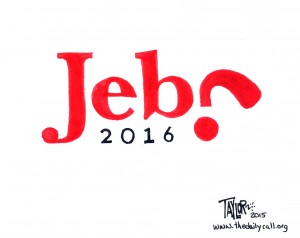By David Weigel
Washington Post (9/8/15)
As the Donald Trump jamboree has played on — and blown out amps — some progressive thinkers have started to see its upside.
Sure, the tycoon-candidate might have forced the Republican Party’s immigration discussion to the right; that was July’s outrage. But his staying power, and the enemies he’s accrued, have gotten campaign reformers and supporters of Great Society liberalism to see the upside in Trump. Here was a Republican candidate telling voters he would not cut Social Security — that fast economic growth would remove the need to even talk about it — and that “hedge-fund guys” needed to pay higher taxes. And he was winning.
“Donald Trump is the first candidate since [John] McCain to essentially break the Republican candidate monopoly on taxes,” wrote New York Magazine’s Jonathan Chait last week. “Trump’s defense of federal retirement programs aligns him with his voters and against the fervent desires of Republican insiders, whose preferences are reflected in the non-Trump field. … Trump has revealed, again, the brittleness of the grip of anti-tax zealots upon the Republican Party.”
Trump can say what many rank and file Republicans think
Yesterday, Chait’s wisdom was embraced and elevated by New York Times columnist Paul Krugman, in a column that called Trump simply “right” about taxes.
“All indications are that Mr. [Jeb] Bush’s attacks on Mr. Trump are falling flat, because the Republican base doesn’t actually share the Republican establishment’s economic delusions,” Krugman wrote. “The thing is, we didn’t really know that until Mr. Trump came along. The influence of big-money donors meant that nobody could make a serious play for the G.O.P. nomination without pledging allegiance to supply-side doctrine, and this allowed the establishment to imagine that ordinary voters shared its antipopulist creed.”
Sen. Elizabeth Warren (D-Mass.) even praised Trump’s tax position on ABC’s “The View” on Tuesday. Like Chait and Krugman, she suggested Trump is actually very much in-tune with the GOP base: “Don’t call us liberal. It is a pretty right position.”
Some cheekiness is at work here, but it’s in the service of something sincere. Progressives have argued for ages — especially since the 2004 publication of Thomas Frank’s “What’s the Matter With Kansas?” — that progressive economics only lose when cultural issues reign and convince (mostly white male) voters to vote against their economic interests.
Republicans, in liberals’ view, have validated this view by the way they campaign. The wealthy donors who fund Republican and third-party ad campaigns do not promise voters that the GOP will means-test Social Security. Quite the contrary; since 2009, hours and hours of TV spots have attacked Democrats for “cutting Medicare” by passing the Affordable Care Act. From Rep. Paul Ryan (R-Wis.) on down, reforms to entitlements have been packaged not as libertarian cost-cutting, but as “saving” the programs for future generations.
The Republican reality outside DC and NYC
“I’ve been arguing for years that conservatism is a way of expressing class anger that always winds up delivering nothing that improves the class situation,” Frank explained in an e-mail. “I never had any doubt that many rank-and-file Republican voters weren’t fans of Wall Street. This is obvious to anyone outside of Washington and New York. The culture wars were one way of expressing class anger, especially during relatively good times.”
To the delight of Krugman, et al., conservatives are not sure what to do about this. Bush, who has taken it upon himself to wield the sword of the “establishment” against Trump, has attacked Trump’s (abandoned) 1999 idea of a surtax on the rich as “the biggest tax increase in American history.” As is the custom, Bush does not say who would have been subjected to the tax — i.e. very wealthy people like Trump, but not his base.
Corporate owned GOP candidates stalling out
And as The Washington Post’s Sean Sullivan and Matea Gold reported last week, the Club for Growth is looking for donors to fund an anti-Trump campaign. The evidence so far is that it can’t attack his populism. The Club said that Trump’s idea of a special tax on outsourcers would “hurt the American economy and cost more American jobs.” His poll numbers crept up anyway — and more tellingly, the candidates in favor of Club-style economics went nowhere. New Jersey Gov. Chris Christie (R), who has been barnstorming New Hampshire with talk about means-testing Social Security, has remained flat in polling, with very high negatives. Sen. Rand Paul (R-Ky.), first out of the gate with the “fake conservative” attack on Trump, has fallen towards low-single digits.
Yet both of those candidates, unlike Bush, have tried to package their ideas as “fair” reforms in a rigged system. “Most of the loopholes in the tax code were designed by the rich and politically connected,” Paul explained when he unveiled his tax plan. In New Hampshire town hall meetings last week, I saw Christie repeatedly tee up his ideas by acknowledging that “loopholes” were inserted in the code by people who benefited from them.
“I think people quite understandably hear about all the tax breaks people get and get angry,” said Grover Norquist, the president of Americans for Tax Reform, in a phone interview from the Burning Man festival earlier this year. “They know their taxes are too high. They hear someone else’s taxes are too low. They hear about tax credits for wind and solar, and special breaks.
“But I think there is always a danger when people talk about tax reform and focus on the people who pay too little, when the largest problem is people who pay too much. What we should be for is bringing everybody’s tax rate down to what the hedge-fund guys are paying.”




